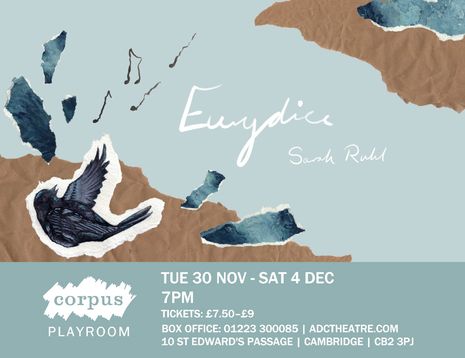Eurydice: An imaginative staging of an ancient story
Theatre Editor Stanley Lawson reviews this weeks Corpus mainshow, Sarah Ruhl’s Eurydice

How to tell a story which is more than two and a half millennia old? This is the question that presumably confronted Sarah Ruhl in the writing of this play, and Frances Arnold and Izzy Collie-Cousins in this production. The answer both seems to come up with is an engaging one, and one that defies easy explanation. More readily identifiable are the strengths of this production, which are two-fold: firstly the fine acting from the three lead actors, and secondly some inspired directorial decisions in terms of staging.
Ruhl’s play, which spawned an opera adaptation last year, is a loose, surreally dream-like yet cleverly constructed text which re-centres the myth of Orpheus onto his wife Eurydice and her relationships with her father, language, and Orpheus himself. While Orpheus and Eurydice’s death-transcending bond remain important, Ruhl introduces an equally strong bond between Eurydice and her father – one which also transcends death. The relationship with her father served as a contrast to that with her husband (to which we are introduced first, and which is very loving); it feels more like a relationship between equals which contains more shared understanding than her marriage.
“Scott-Haynes and Lucas, who captured the chemistry of an engaged couple wonderfully”
These relationships in Ruhl’s writing are illuminated by the acting of the three leads – Charlie Scott-Haynes as Orpheus, Orli Vogt-Vincent as Father and, in a brilliant Cambridge stage debut, Louella Lucas in the titular role. The flush of fresh youthful love and all the difficulties it papers over filled the stage in the early scenes between Scott-Haynes and Lucas, who captured the chemistry of an engaged couple wonderfully. Scott Haynes shined in these first few scenes, playing well off the tension between Orpheus’s love for Eurydice and the self-involved male creative ego in the text (when asked ‘What are you thinking about’ by Eurydice, Orpheus effectively answers ‘you… and music’). Lucas plays Eurydice successfully as a dreamer and a thinker; the pain in the emotional separations the character undergoes was played subtly, making moments of emotional breaking all the more effective. Given the danger and adversity Eurydice encounters it would have been easy to play her all on one note, but Lucas gives her performance enough variation in intention to keep the audience engaged.
Some aspects of the staging were a triumph – the intricate use of red wool across the stage to weave connections and walls was brilliant, visualising the tensions within the play without cheapening the unspoken feeling. Equally effective was the movement of the chorus – ‘the stones’ (Emma Robinson, Elena Pare and Lydia Makrides) – choreographed by Arianna Munoz. Both performers and movement director ought to be proud of the playful yet slightly malevolent energy they brought to the production, animating the stage and their interactions with other characters (the last movement sequence with Father and the stone was particularly engaging). Unfortunately, the chorus was largely alone in this animation – it felt at times as though the other characters were rooted to the spot while talking.
Eurydice is a taut, surreal and dreamy play which had been brought to the Corpus Playroom in this production with great imagination and clear vision; in its moments of deep pathos, it connects powerfully to the audience. Arnold and Collie-Cousins, with no small amount of help from their performers, Munoz and Sarah Ruhl herself, have breathed life into a very old story.
 News / Right-wing billionaire Peter Thiel gives ‘antichrist’ lecture in Cambridge6 February 2026
News / Right-wing billionaire Peter Thiel gives ‘antichrist’ lecture in Cambridge6 February 2026 News / John’s duped into £10m overspend6 February 2026
News / John’s duped into £10m overspend6 February 2026 News / Epstein contacted Cambridge academics about research funding6 February 2026
News / Epstein contacted Cambridge academics about research funding6 February 2026 News / Lucy Cav students go on rent strike over hot water issues6 February 2026
News / Lucy Cav students go on rent strike over hot water issues6 February 2026 News / Corpus FemSoc no longer named after man6 February 2026
News / Corpus FemSoc no longer named after man6 February 2026










